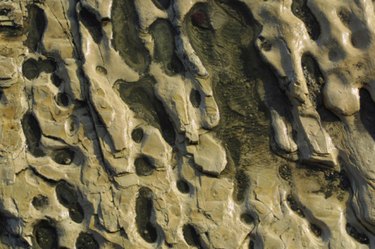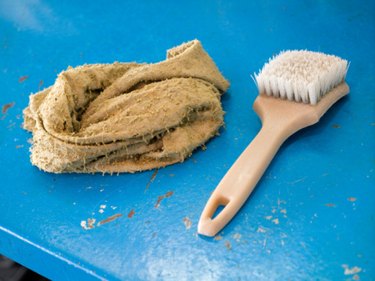
Sandstone, as its name infers, is comprised of sand. It is a common sedimentary rock found wherever there is water, such as a river or sea. Sandstone is used for many landscaping items, such as paving stones, and generally does not need much maintenance. However, sandstone naturally has many small pores and holes that can acquire a buildup of dirt over time. Algae can also grow in the small cracks and cause the stone to blacken. Some people enjoy the patina of aged sandstone, while others prefer to keep it clean.
Scrubbing
Video of the Day

Old sandstone paving stones and objects are effectively cleaned with water and a good scrubbing. However, take care when cleaning since sandstone is a porous rock and any abrasive action might wear the rock down. The minerals in sandstone actually provide it with some protection, and a severe scrubbing may work to weaken and remove this protective layer. Try using a soft-bristled brush to remove any built-up dirt and residue.
Video of the Day
Chemical Methods
Over time, old sandstone may acquire a patina of algae, making sandstone pavers slippery. This algae is removable through chemical means. The chlorine in household bleach will get rid of algae or moss as soon as it is applied. Dab the bleach onto the stones or garden objects and gently scrape off the dead algae gently. Be careful when using bleach as it can burn greenery; do not dispose off down the street sewers.
Nonchemical Methods
An ecological way of getting rid of mildew stains on sandstone is to use shredded white paper soaked in hot water. When wet, squash the paper into pulp and spread the mixture onto the mildewed sandstone. The porous stone will at first draw the water out of the pulpy paper but then the process will reverse as the paper dries. When the paper reabsorbs the moisture, it will absorb the mildew stain as well.
High-Pressure Washing
Water from high-pressure washers will definitely clean off dirt, algae or mildew from sandstone, but the pressure of the water could also damage the soft sandstone. Use high-pressure washing as carefully as possible or as a last resort when dirt cannot be removed any other way.